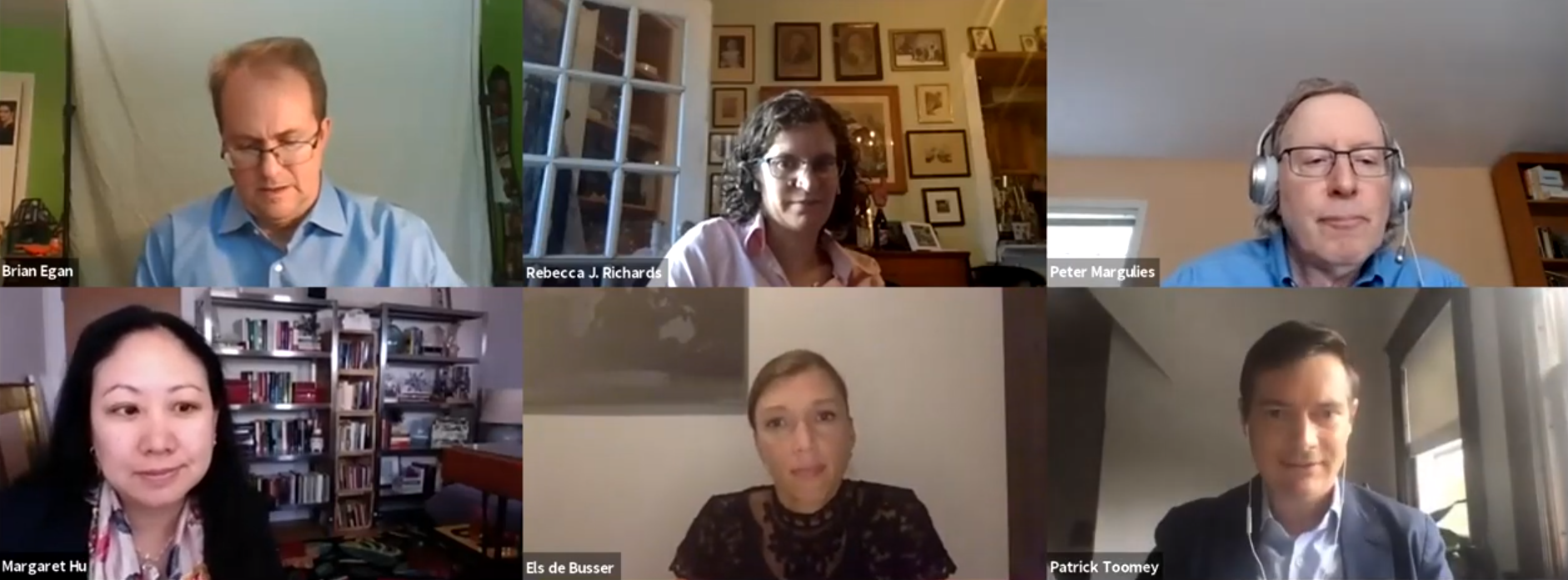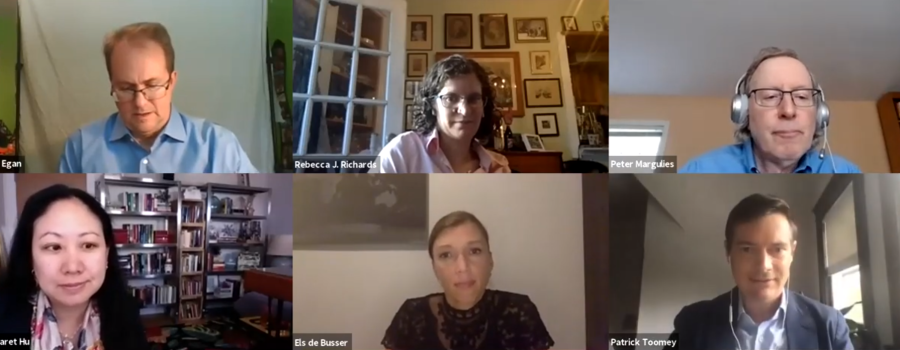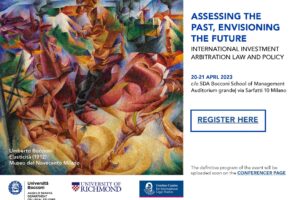Surveillance, Privacy, and Human Rights: The Outlook for 2021

This post was authored by ABILA Student Ambassador Chantal Sochaczevski, Washington University School of Law ‘22, Criminal Law Society President.
ILW 2020 featured a lively panel on “Surveillance, Privacy, and Human Rights: The Outlook for 2021.” Peter Margulies, a professor at Roger Williams University School of Law and an expert in national security law, moderated the discussion among the five panelists: Brian Egan, a partner at Steptoe & Johnson; Els de Busser, a professor at Leiden University; Rebecca J. Richards, Director at NSA Office of Civil Liberties and Privacy; Margaret Hu, a professor of Law and of International Affairs at Penn State Law; and Patrick Toomey, a senior staff attorney at American Civil Liberties Union.
Many audience questions focused on the use of surveillance by countries other than the United States, and particularly on the surveillance regime in the People’s Republic of China in respect to the Uyghur population. Mr. Toomey noted that “from the U.S. perspective, we often look at what is happening in China as one of the possible paths that these technologies could take here and certainly the human rights abuses that are reported [on] China are egregious and alarming.” Mr. Toomey also acknowledged that U.S. companies are involved in exporting some of the technologies that are used for surveillance purposes in China, questioning the legal and ethical responsibilities companies have to ensure their tools are not used to facilitate gross human rights abuses. He concluded that it is an “alarming model of how certain technologies can be integrated and put together in ways to track people … creating a chilling effect for an entire society.”
Mr. Egan elaborated that it is “interesting to see what leverage the U.S. government has to oppose what is going on … in China.” He expressed that although “some people think that [the government involvement] is convenient and tied to other goals related to China,” the current [U.S.] government has been quite vocal” and that there is a “genuine human rights concern.” Mr. Egan mentioned economic sanctions, import bans on “certain products coming from the region,” and “working with the EU to get the EU to impose sanctions” as tools the U.S. government is attempting. The U.S. Congress has demanded accountability from companies as it is not only surveillance companies but also retail companies that are taking advantage of the cheap labor in the region. He noted that America’s reaction to China is an interesting case study on how a country can react bilaterally to stop a human rights abuse without utilizing the “more traditional multilateral tools.” Nevertheless, he highlighted that there are limits on what one country can do in this situation.
The next question was about foreign interference in American elections. Ms. Richards stated that the best way to protect our democracy is to “go out there and vote.” She expressed that the intelligence community is working very hard to protect the election but that voting is done at the local level, which she said is “both a feature and a bug,” since each county is different. Prof. Hu added that “there seems to be a demonstrable link between the penetration of voter registration data bases and pointed interference.” She warned that in this “cyber-world that we live in,” the road of the data should be followed, not just the money, because the “data can be exploited for geo-political gain.”
Next, it was inquired if indictments of foreign officials are useful steps or just charades. Prof. de Busser pointed out that when an indictment is never going to lead to a prosecution, there “has to be a political message” behind it. Mr. Egan agreed there is some value and good reason in informing the public that activity has been identified. The discussion continued with a question on the procedure used in a FISA court’s proceedings. Specifically, the panelists discussed whether technical amici or a public advocate office—taking up a position contrary to that of the government on civil liberties and privacy issues—should be further institutionalized. There are proposals on the table that will expand the requirement to appoint an amicus in certain types of cases.
The final question posed inquired if there should be an express right to data protection under international human rights law. Panelists agreed there is some merit because that would provide data subjects with more tools to argue cases. Prof. de Busser shared that she usually uses the Cambridge Analytica Facebook case to explain the difference between privacy and data protection and the merit of having both rights independent of each other. She clarified that the aforementioned case is hard to argue based on the right to privacy as defined by the EU, but much easier to argue based on the right to data protection. The conversation then pivoted to the fact that the U.S. does not have something similar to the GDPR. Prof. Hu argued that it would be beneficial to have a more uniform protection in light of all these new pandemic surveillance technologies being implemented under differing state laws. Overall, the distinguished panelists analyzed critical issues during the session and left the audience with thought-provoking insights.




